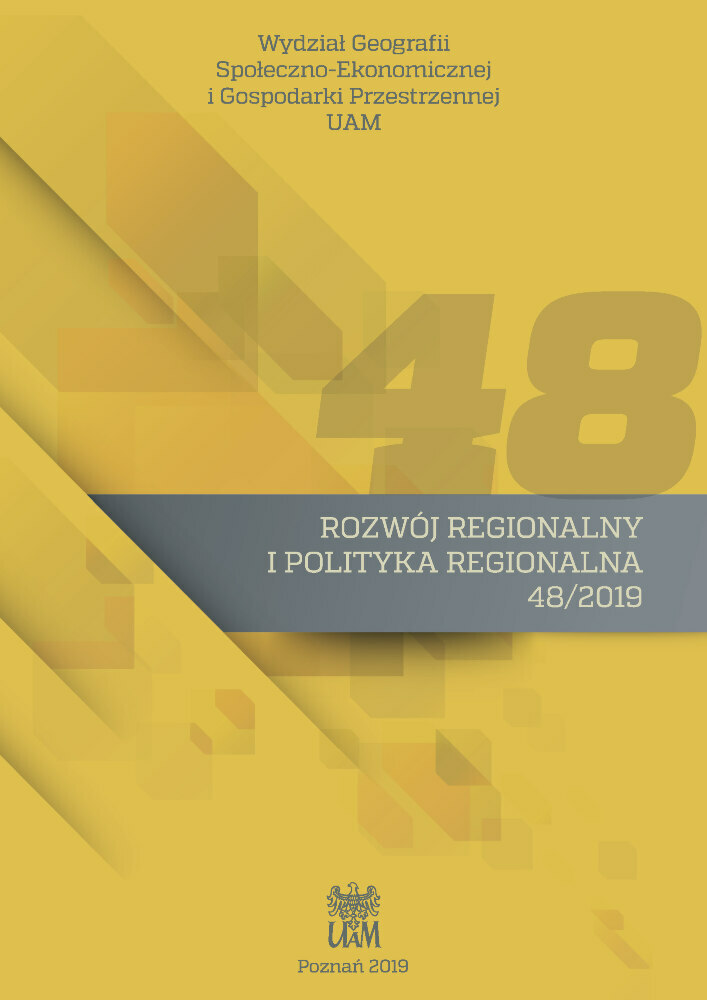Abstract
Cities are not equally prepared to adopt the solutions characteristic for a smart city. This problem was analysed by the author and the results were presented in the empirical part of the article on the basis of the city of Poznań. Various factors have the impact on the variety and dynamics in the process of formulating concepts of a smart city and therefore they make it an interesting area of study. The aim of this article is the attempt to sum up different attitudes to defining a smart city and to indicate their common features. The aim of the empirical part is, however, to present the preparedness of the city of Poznań to adopt the solutions as a smart city. The main thesis of this article is the statement that the concept of a smart city is strongly connected with the technological progress and as technologies develop, new areas of activities of the city appear and can be implemented.
References
Alizadeh T. 2018. Crowdsourced Smart Cities versus Corporate Smart Cities. IOP Conference Series: Earth and Environmental Science, 158. Institute of Physics Publishing (https://doi.org/ 10.1088/1755-1315/158/1/012046).
Anthopoulos L. 2019). Smart City Emergence. Cases From Around the World. Elsevier.
Anthopoulos L.G., Series I.T. 2018. The Rise of the Smart City. 2. The rise of the Smart City (https:// doi.org/10.1007/978-3-319-57015-0).
Carrillo F.J. i in. 2008. Rising knowledge cities: the role of urban knowledge precincts. Journal of Knowledge Management, 12(5): 8–20.
Castells M. 1996. The rise of the network society: The information age. Economy, Society, and Culture, 1.
Cellary W. 2019. Współczesny obieg danych (c).
de Falco S., Angelidou M., Addie J.P.D. 2019. From the “smart city” to the “smart metropolis”? Building resilience in the urban periphery. European Urban and Regional Studies, 26(2): 205–223 (https://doi.org/10.1177/0969776418783813).
Dijkstra L., Garcilazo E., McCann P. 2015. The effects of the global financial crisis on European regions and cities. Journal of Economic Geography, 15(5): 935–949 (https://doi.org/10.1093/jeg/ lbv032).
Gajewski J., Paprocki W., Pieriegud J. 2015. Megatrendy i ich wpływ na rozwój sektorów infrastrukturalnych.
Hancke G.P., de Silva B., Hancke G.P. 2013. The role of advanced sensing in smart cities. Sensors (Switzerland) (t. 13) (https://doi.org/10.3390/s130100393).
Huggins R. 2003. Creating a UK competitiveness index: regional and local benchmarking. Regional Studies, 37(1): 89–96 (https://doi.org/https://doi.org/10.1080/0034340022000033420).
Joss S., Sengers F., Schraven D., Caprotti F., Dayot Y., Joss S., Dayot Y. 2018. The Smart City as Global Discourse: Storylines and Critical Junctures across 27 Cities (February 2019) (https://doi.org/1 0.1080/10630732.2018.1558387).
Kitson M., Martin R., Tyler P. 2004. Regional competitiveness: An elusive yet key concept? Regional Studies, 38 (https://doi.org/https://doi.org/10.1080/0034340042000320816).
Komninos N. 2002. Intelligent cities: innovation, knowledge systems, and digital spaces. Taylor & Francis.
Korenik A. 2019. Smart Cities – miasta inteligentne w Europie i Azji. CeDeWu, Warszawa.
Pięta-Kanurska M. 2017. Wehikuły rozwoju współczesnych miast. Wyzwania dla Wrocławia. Studia KPZK PAN, 177: 185–188 (https://doi.org/DOI: 10.24425/118581).
Pięta-Kanurska M. 2018. Wprowadzenie. Medycyna nowożytna: studia nad historia medycyny. Polska Akademia Nauk, Instytut Historii Nauki.
Mora L., Deakin M. 2019. Smart city development in Europe. Untangling Smart Cities, (July): 135– 170 (https://doi.org/10.1016/b978-0-12-815477-9.00005-0).
Mora L., Deakin M., Reid A. 2019. Strategic principles for smart city development: A multiple case study analysis of European best practices. Technological Forecasting and Social Change, (July) 142: 70–97 (https://doi.org/10.1016/j.techfore.2018.07.035).
Moustaka V., Vakali A., Anthopoulos L.G. 2018. A Systematic Review for Smart City Data Analytics (March 2019) (https://doi.org/10.1145/3239566).
Orłowski A. 2019. Model gotowości procesowej urzędu miejskiego dojścia do smart city. CeDeWu, Warszawa.
Porter M.E. 1998. Clusters and the new economics of competition. Harvard Business Review, 76(6): 77–90.
Samih H. 2019. Smart cities and internet of things. Journal of Information Technology Case and Application Research, 21(1): 3–12 (https://doi.org/10.1080/15228053.2019.1587572).
Vence X., Pereira Á. 2018. Eco-innovation and Circular Business Models as drivers for a circular economy. Contaduría y Administración, 64(1): 64 (https://doi.org/10.22201/fca.24488410e.2019.1806).
Yigitcanlar T., Inkinen T., Makkonen T. 2015. Does Size Matter? Knowledge-Based Development of Second-Order City-Regions in Finland. Disp, 51(3): 62–77 (https://doi.org/10.1080/02513625. 2015.1093352).
Yovanof G., Hazapis G. 2009. An Architectural Framework and Enabling Wireless Technologies for Digital Cities & Intelligent Urban Environments. Wireless Personal Communications, 49(3): 445–463.
License
Copyright
© 2019 WGSEiGP, Uniwersytet im. Adama Mickiewicza w Poznaniu
OPEN ACCESS
